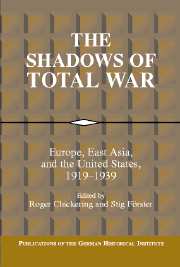Book contents
- Frontmatter
- Introduction
- Part One Reflections on the Interwar Period
- Part Two Legacies of the Great War
- 4 Religious Socialism, Peace, and Pacifism: The Case of Paul Tillich
- 5 No More Peace: The Militarization of Politics
- 6 The War’s Returns: Disabled Veterans in Britain and Germany, 1914-1939
- 7 The Impact of Total War on the Practice of British Psychiatry
- Part Three Visions of the Next War
- Part Four Projections and Practice
- Index
4 - Religious Socialism, Peace, and Pacifism: The Case of Paul Tillich
Published online by Cambridge University Press: 05 January 2013
- Frontmatter
- Introduction
- Part One Reflections on the Interwar Period
- Part Two Legacies of the Great War
- 4 Religious Socialism, Peace, and Pacifism: The Case of Paul Tillich
- 5 No More Peace: The Militarization of Politics
- 6 The War’s Returns: Disabled Veterans in Britain and Germany, 1914-1939
- 7 The Impact of Total War on the Practice of British Psychiatry
- Part Three Visions of the Next War
- Part Four Projections and Practice
- Index
Summary
In the late 1950s and early 1960s Paul Tillich was celebrated in the Federal Republic of Germany as an apostle of international understanding and peace. In 1956 the city of Frankfurt awarded him its Goethe Medal. In order to appreciate the significance of this distinction, one must first recall that in postwar Germany, Goethe symbolized not only German idealism but also the best features of the German tradition of humanism and cosmopolitanism - values that stood diametrically opposed to the chauvinism of the Nazi regime. In 1958 Tillich was again honored by the city of Hamburg with the prestigious Goethe Prize; and in 1962 he received the even more prestigious Friedenspreis des deutschen Buchhandels, the peace prize of the Society of German Publishers, which was awarded in a public ceremony in the Paulskirche. These events testified to the desire of Germans to demonstrate that they had learned the lessons of recent history and from the experience of Nazi terror and aggression. Tillich, the distinguished theologian and philosopher, now served as a German crown-witness to international peace.
The remarkable role that Tillich played in postwar Germany raises questions about his views on peace and pacifism during the interwar period. It is fitting to begin with an episode that changed the life of one of Weimar's leading Religious Socialists. On November 6, 1928, Pastor Günther Dehn lectured in Magdeburg's Ulrichskirche on “The Church and International Reconciliation.” Here Dehn declared that Christians should not regard the Fifth Commandment as a strict principle, but rather as a guideline to be discussed and redefined as the political situation changed. He then questioned whether national interest was a valid justification for going to war.
- Type
- Chapter
- Information
- The Shadows of Total WarEurope, East Asia, and the United States, 1919–1939, pp. 85 - 96Publisher: Cambridge University PressPrint publication year: 2003



